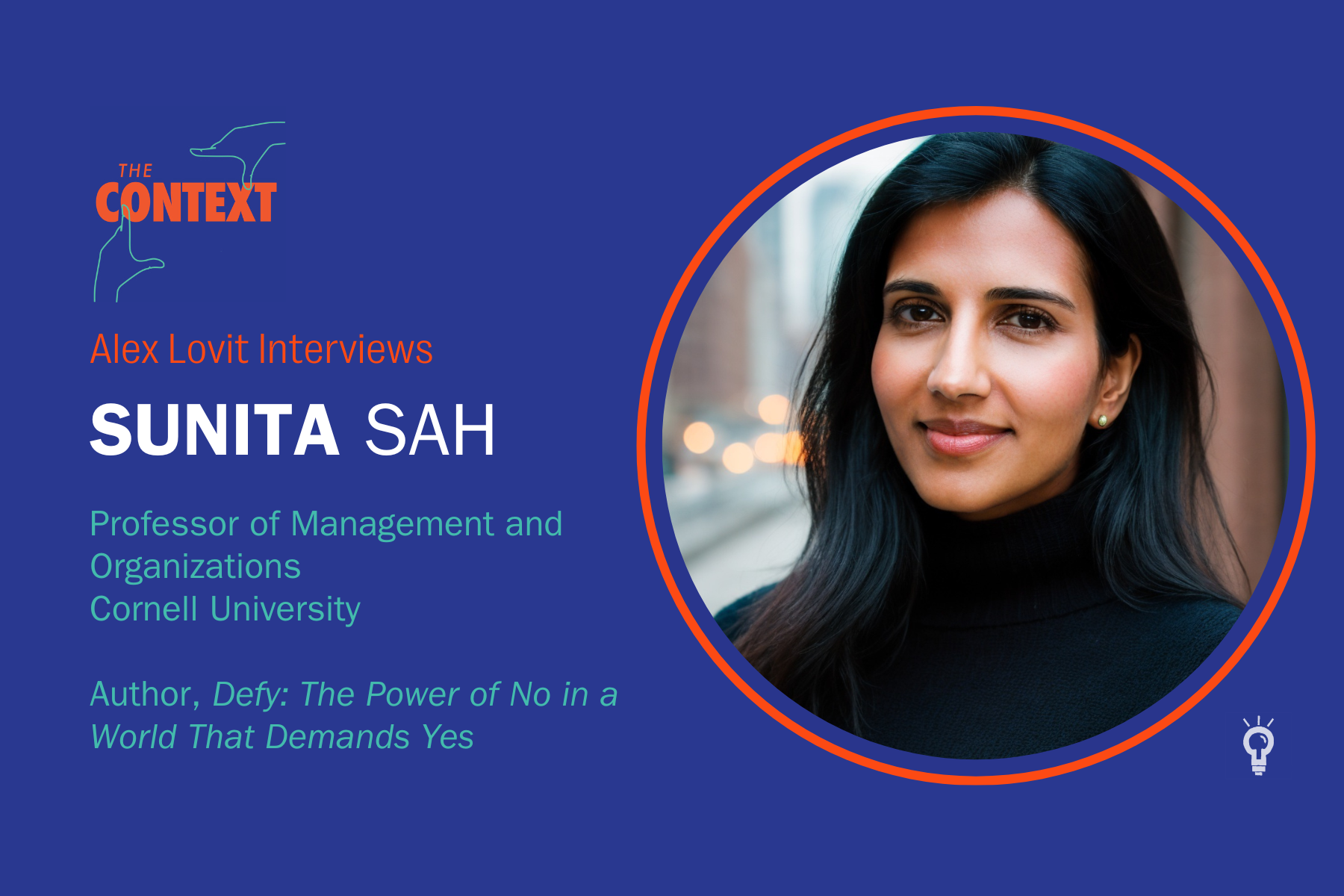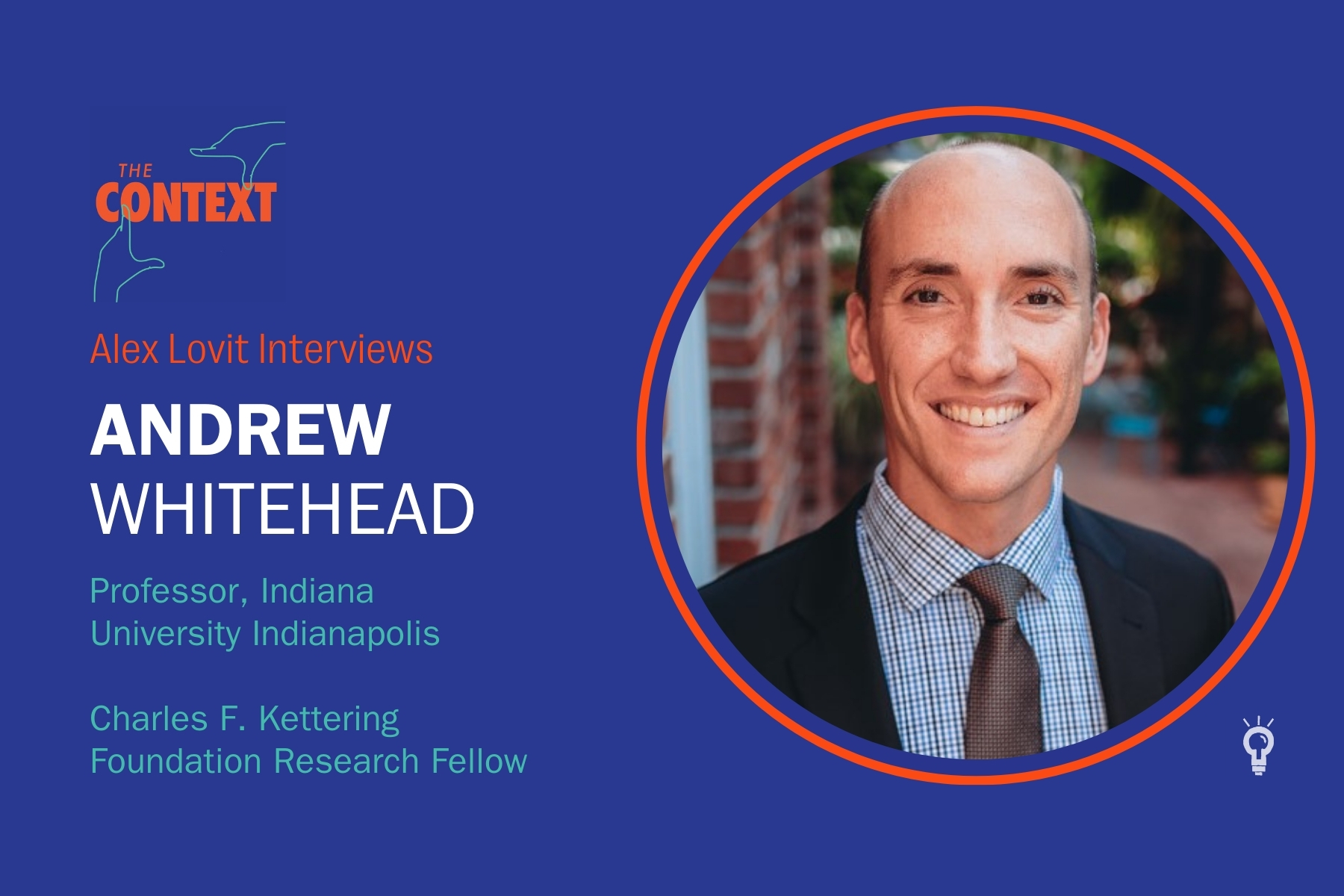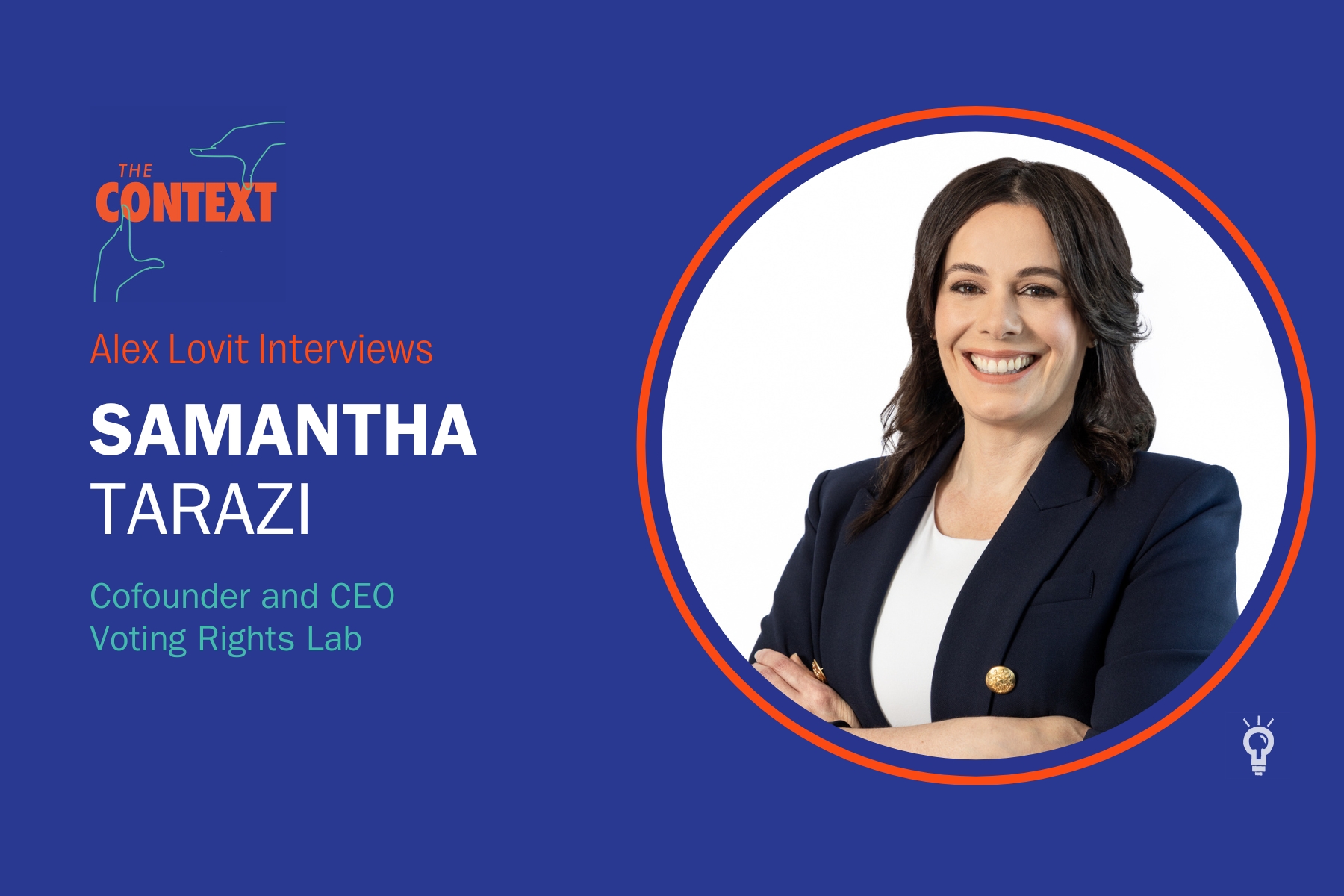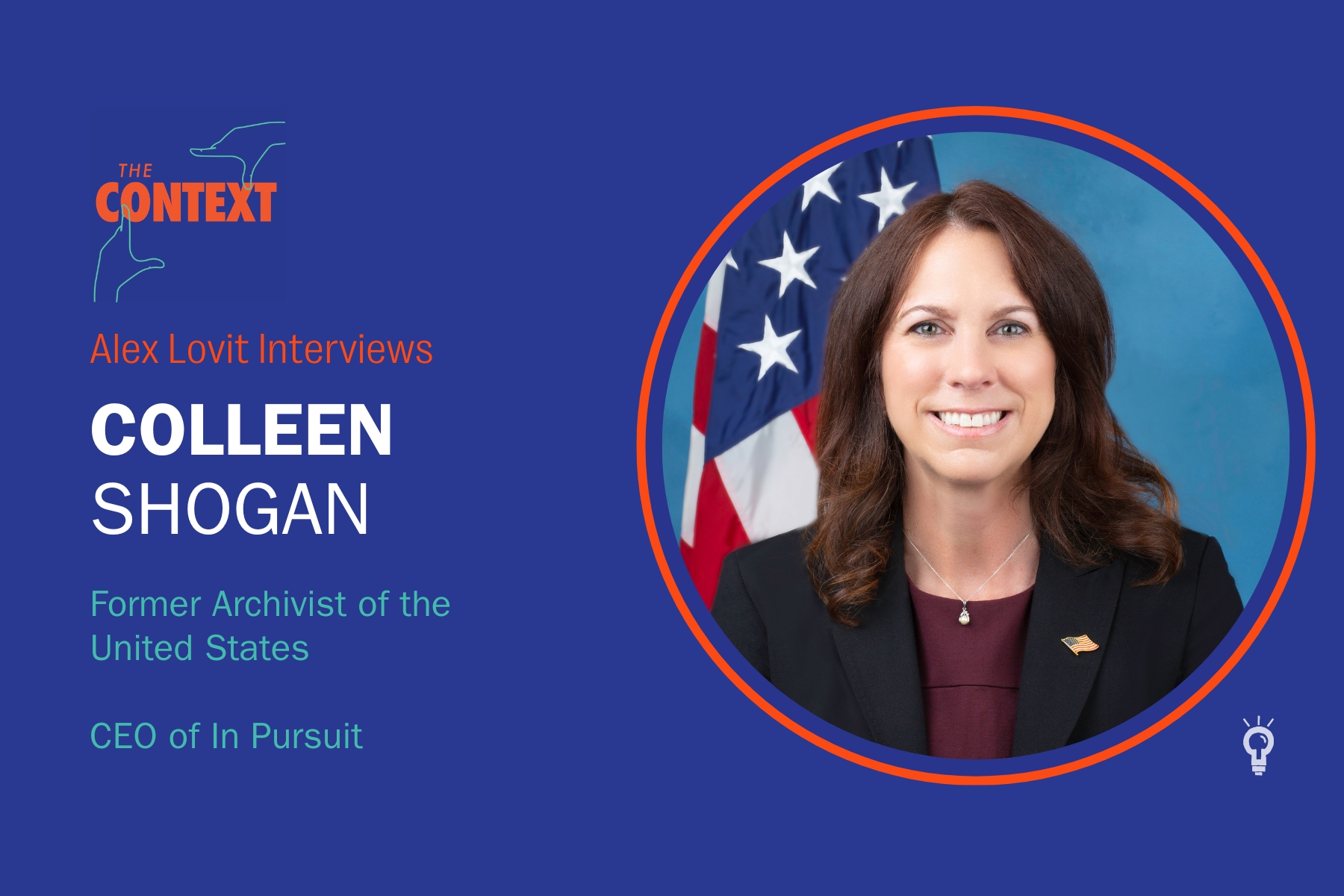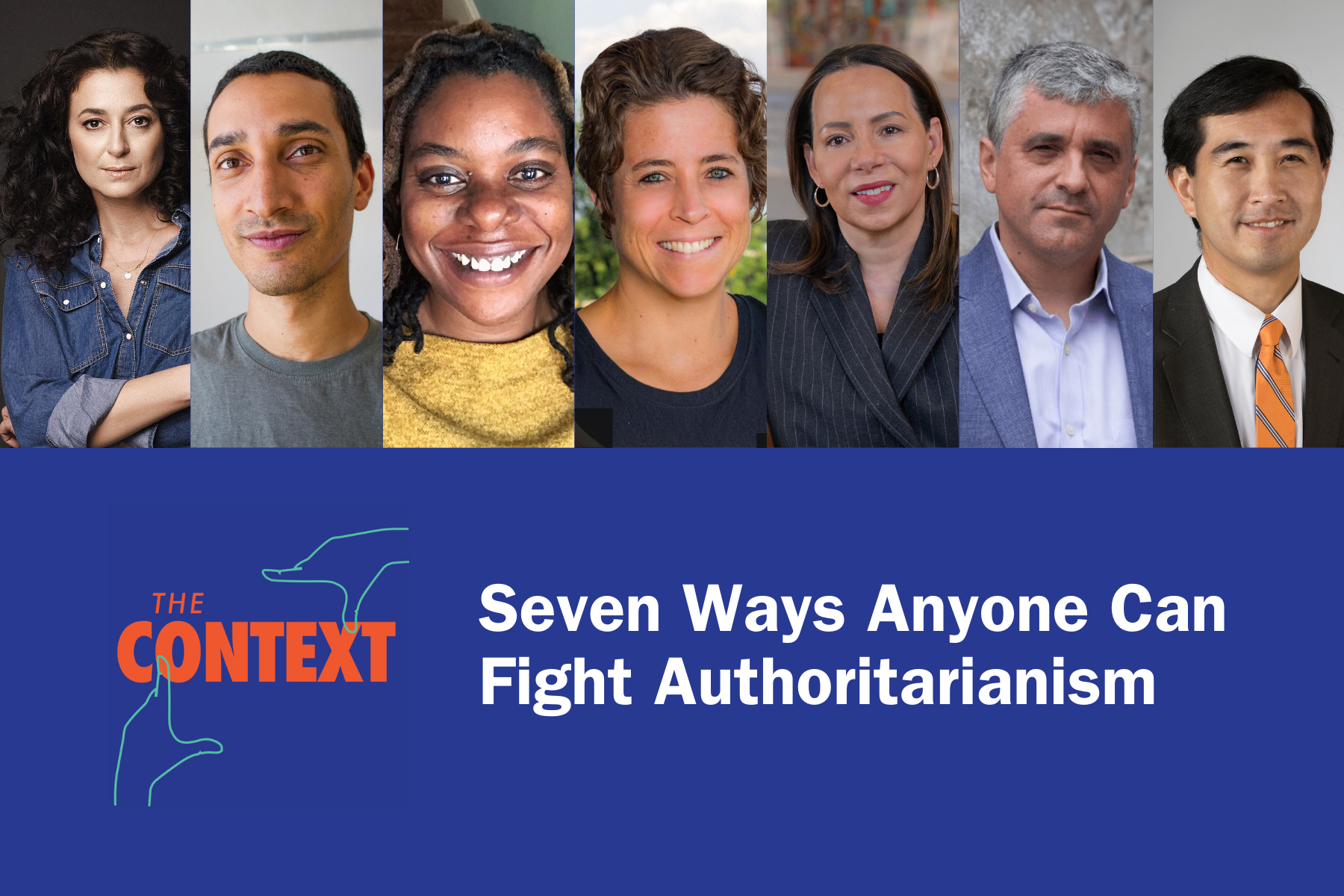Only Bad People Have Bad Politics. Right?
Americans are constantly arguing about politics—on the internet and at the family dinner table. But we rarely change one another’s minds, and we often emerge from those disagreements feeling frustrated and distrustful. Host Alex Lovit is joined by research psychologist Keith Payne to discuss the science behind the political divide and how the psychology of political disagreements can help us have more productive political conversations.
Keith Payne is a professor of psychology and neuroscience at the University of North Carolina. He is the author of The Broken Ladder: How Inequality Affects the Way We Think, Live, and Die and Good Reasonable People: The Psychology Behind America’s Dangerous Divide.
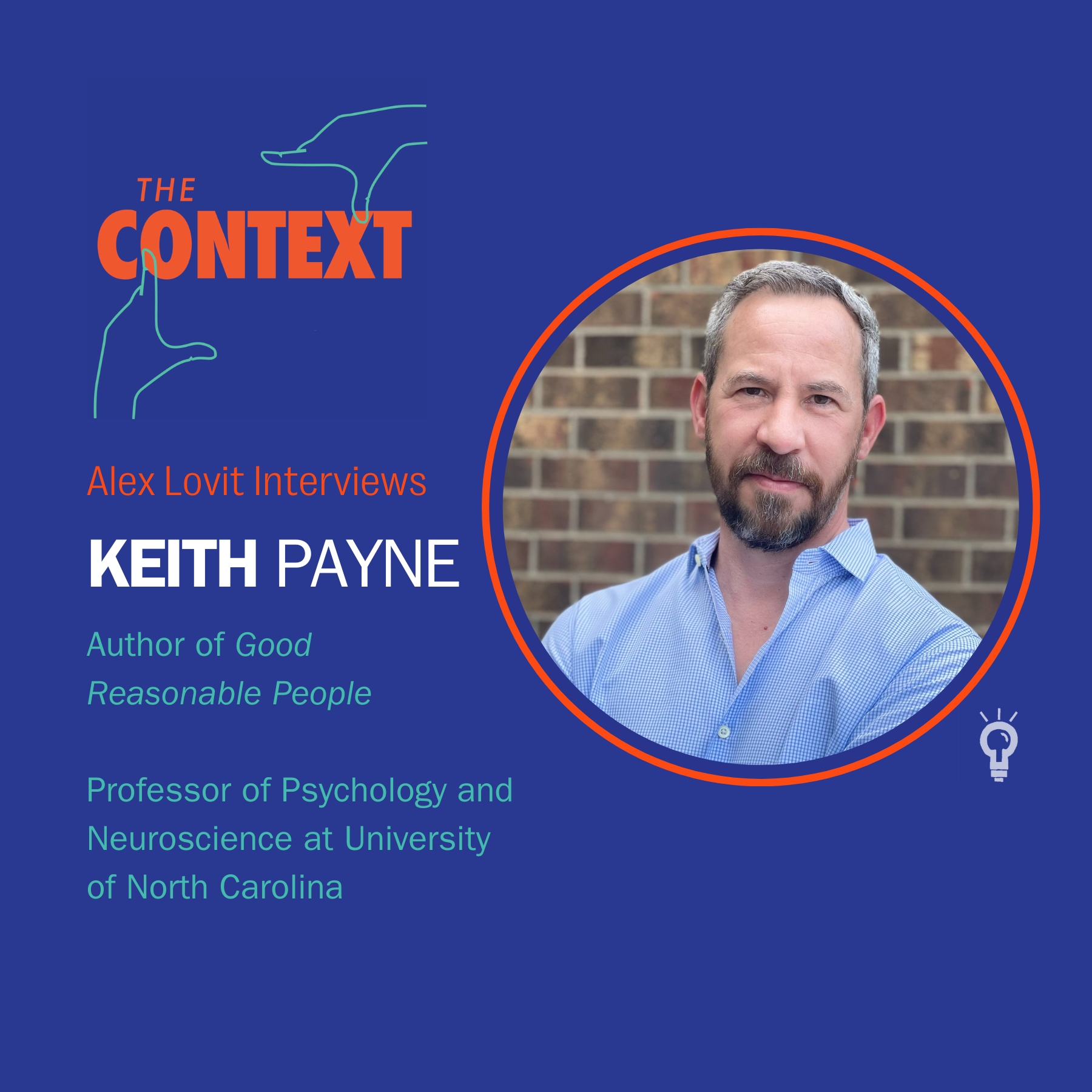
Share Episode
Only Bad People Have Bad Politics. Right?
Americans are constantly arguing about politics—on the internet and at the family dinner table. But we rarely change one another’s minds, and we often emerge from those disagreements feeling frustrated and distrustful. Host Alex Lovit is joined by research psychologist Keith Payne to discuss the science behind the political divide and how the psychology of political disagreements can help us have more productive political conversations.
Keith Payne is a professor of psychology and neuroscience at the University of North Carolina. He is the author of The Broken Ladder: How Inequality Affects the Way We Think, Live, and Die and Good Reasonable People: The Psychology Behind America’s Dangerous Divide.

Share Episode
Only Bad People Have Bad Politics. Right?
Listen & Subscribe
Americans are constantly arguing about politics—on the internet and at the family dinner table. But we rarely change one another’s minds, and we often emerge from those disagreements feeling frustrated and distrustful. Host Alex Lovit is joined by research psychologist Keith Payne to discuss the science behind the political divide and how the psychology of political disagreements can help us have more productive political conversations.
Keith Payne is a professor of psychology and neuroscience at the University of North Carolina. He is the author of The Broken Ladder: How Inequality Affects the Way We Think, Live, and Die and Good Reasonable People: The Psychology Behind America’s Dangerous Divide.
Alex Lovit: Americans are constantly arguing about politics online or at the family dinner table, but when’s the last time you heard someone say, “That’s a good point, you just changed my mind about who to vote for.” When’s the last time you said that? So what are we doing when we argue about politics? It turns out understanding the psychology of our arguments may help us to have better conversations.
You are listening to The Context. It’s a show from the Charles F. Kettering Foundation about how to get democracy to work for everyone and why that’s so hard to do. I’m your host, Alex Lovit. My guest today is Keith Payne. He’s a professor of psychology and neuroscience. He studies how psychology affects our political beliefs and behavior. And his most recent book is, Good Reasonable People: The Psychology Behind America’s Dangerous Divide.
Keith Payne, welcome to The Context.
Keith Payne: Thanks so much for having me. Good to be here.
Alex Lovit: So you study political psychology, and I definitely want to get into the political side of that story, but I thought we could start by just laying out some of the psychological concepts that you draw from in your work. So I thought we could start with group identity. So in your most recent book, you describe the research of psychologist Henri Tajfel and his research into minimal groups. Can you just describe what Tajfel was trying to study and what did he end up finding?
Keith Payne: Right, so Tajfel was interested in the ways that social identities organize our interactions with the world. So by social identity, I mean the groups we belong to that form a sense of our identity. So I might really be identified with being a college professor and a father, but I might not identify with other roles that I have in my life, even though those are groups that I also belong to.
What Tajfel was trying to test is how minimal we can make the social groups and they would still have an effect on us. So he created these arbitrary groups where he asked people to, for example, say which of two paintings they liked better. And if you liked painting number one better, you’re in group one. If you liked painting number two better, you’re in group two. And then he had those two groups interact in the sense of deciding which group gets a larger slice of the payment for being in the study and to rate the in-group, that is the group people belong to, and the out-group, the group they don’t belong to on various personality traits. And even with such a stupid minimal categorizations, which one of these two paintings do you like better? People started derogating the out-group, flattering the in-group and keeping a larger share of the rewards for themselves. And so the point he’s making is that groups are so powerful that even the tiniest membership in a pretty meaningless group is enough to make us start acting like group members that really want to defend our groups.
Alex Lovit: Yeah, so as you’re saying that’s striking because, yesterday I didn’t even know these groups existed, today I identify, I liked painting A over painting B, and that’s important to me. And we all, as you say, hold multiple identities. I’m a White man, I live in Ohio. I have a PhD in history. I’m a podcaster, I’m a Libra. Some of those are more important to me than others, some of them are more defining of how people see me than others. Is there any pattern to which identities are most constructive of political behavior or belief?
Keith Payne: Yeah, when it comes to politics, at least in American politics today, one of the biggest organizing social identities is race, also to some extent other identities like social class and education groups, but those are sort of the biggest ones that our politics are revolving around today and that’s a source of a lot of the polarization.
Alex Lovit: If a lot of our political behavior is driven by our group identity, who decides what the group thinks?
Keith Payne: Yeah, that’s a good question. A lot depends on what elite leaders, politicians, news broadcasters, and folks like that say the group thinks. So there’s this back and forth in which leaders try to appeal to the identity groups that tend to make up that party’s base, and how well they do is rewarded by getting elected. So it’s this back and forth dynamic between elite leaders and mass public opinion.
Alex Lovit: Well, let me ask about another concept that you’ve written a lot about, which is social status. That’s another kind of idea that’s pretty core in human psychology to how we experience the world, how we understand our relation to other people. Can you just briefly explain how status shapes how people understand themselves and the world around them, and how does psychological research demonstrate that?
Keith Payne: Yeah, so status is about where we think we stand compared to other people. And there are certain elements related to status that are objective, how much income you make, what degree of education you have and things like that, but when it comes down to it, what really matters psychologically is perceived status, subjective status, where I feel like I belong compared to other people in my reference groups. And that’s informed to some extent by objective indicators like income and education and things like that but they don’t go that tightly together. So there are a lot of people who by objective indicators would be high socioeconomic status but don’t feel like it, and there are a lot of people who by objective indicators would be lower socioeconomic status and they don’t feel like it. So what really matters is where you feel you are in terms of the social ladder compared to other people and that has a lot to do with the social comparisons we make and who the reference groups are that we choose to compare ourselves to.
So you may make a six-figure salary and have a college education, but everybody else and hang around with and consider a relevant comparison group also is in that same income bracket, you’re probably not going to feel especially well off because everybody else you know is in the same position. So that sense of subjective or perceived status is really important for how we make sense of the world and what we find in our research is that higher perceived status is associated with more Republican voting patterns and identification, whereas lower perceived status is associated with more liberal political tendencies.
Alex Lovit: So we’ve been talking about social groups, social identity and also social status. Do those things go together? Are people, when they’re making these comparisons of where they stand relative to other people? Are they thinking in terms of their group? Are they thinking in terms of themselves individually?
Keith Payne: I think it’s important to make that leap between the objective demographic sorts of indicators that we see all the time talked about in polling, like racial groups, income levels, education levels, and those things are definitely predictive of how people vote and how they participate in politics. But they’re always filtered through how we see ourselves. And if you might belong to a group nominally, but if you don’t feel attached to that group, it’s not going to be a powerful sense of your social identity and it’s probably not going to influence your politics. What we see more and more as part of the polarization going on over the last 20 plus years in American politics, is that people are identifying more and more with their racial and ethnic groups, and often less with their income groups. So, you see interesting patterns. We have these stereotypes that Republicans are the party of the working class and Democrats are the party of educated elites. And that really muddles the picture compared to what’s actually going on.
If you look at the way that income predicts voting behavior, lower income is associated with voting Democrat, not Republican. And that’s sort of consistent with the way the Democrats have traditionally seen themselves as a working class party. But especially since the rise of Donald Trump, we talk about Republicans as becoming the party of the working class, but that doesn’t track income. What predicts voting more Republican and voting for Trump is actually lower levels of education.
So, this creates a tricky situation, because generally higher education goes with higher income. That’s why everybody says, “Oh, you have to go to college, get an education so you can get a good job, have a higher income, et cetera.” But those two things go in opposite directions in terms of political behavior. So, higher education is associated with supporting Democrats and higher income is associated with supporting Republicans.
Alex Lovit: So, you’re getting into how this applies politically, and I definitely want to go there. Let me ask about one last psychological concept in a more broad sense, which is the idea of the subconscious or the unconscious. One response to everything we’ve been saying so far might be, “Well, maybe identity and status shape how other people view the world, but me, that’s not important to me.” What would you say to that person?
Keith Payne: We rarely think of ourselves as explicitly reasoning about our identities. So, we don’t say, “Well, I’m a White man in my forties, therefore I am going to endorse this argument.” It works more subtly than that. What happens is that we see both sides of an argument playing out in the newspapers or on social media, or in candidates talking. And what we say is, “Well, I resonate with that argument. That makes sense to me.” Or, “That argument is total crap. I don’t buy that for a minute.” So, we’re focused on the content of the argument, but we’re not focused on why we accept some arguments and reject others. And our social identities have a big role to play in that both partisan identities and other social identities, like race, and sex, and class and things like that.
So, you have to take one step back if you want to understand the psychology of it. And not just look at the arguments, the reasons, the facts and the evidence, but why some people find these facts to be compelling, and these arguments to be compelling, and other people find other arguments and facts to be compelling. I wouldn’t say it’s subconscious in the deep Freudian sense of unconscious necessarily, but it’s definitely the case that we’re focused on the surface level when arguments and reason and evidence. And usually, ignoring why we’re compelled or feel attracted to one side’s arguments and not the other.
Alex Lovit: Part of what I find striking about your work is we all like to think of ourselves as rational people. And when you look at political psychology, it kind of forces you to confront some of your own biases and ways in which your opinions aren’t necessarily based entirely on rational argument.
Keith Payne: There’s two things happening at once, and that’s what makes it confusing and difficult to talk about sometimes, because There is rational argumentation and reasoning going on all the time. If you’re on social media, you see people arguing with each other. They’re talking about policies, they’re talking about people, candidates, issues. And so, it looks like what we’re talking about is reasoning, and argumentation, and evidence. And yet, we can predict which side of the argument, which kind of evidence you are going to find compelling if we know just a few things about you, like your race, your education level, and things like that. So, there’s multiple things going on. And we’re talking at this level of arguments and policy. But of course, if you’re observing an argument on Twitter or social media or something, you can just see it play out all the time. One side marshals one kind of evidence, the other side responds with a different kind of evidence that they say is relevant.
Neither one persuades anybody. And you already know how this is going to end, but they’re doing it all in the language of argumentation. And so, one way to look at that is, well, you shouldn’t just blindly follow your group. You should have reasons for what you do and reasons for why you believe what you believe. And at the same time, what we’re doing by arguing with each other over facts, and reasons, and evidence, and policies, is literally rationalizing the positions we want to end up at. There’s two definitions for a reason. One is the cause for doing something, but the other is to find a justification for something you’re doing. And I think we’re engaging… when we say we’re reasoning, we’re actually doing a lot more rationalization and justification than we are just objectively processing information to find truth.
Alex Lovit: Yeah. And we could be so good at that, that then we talk ourselves into, oh, yeah, that was the reason why I came to that conclusion.
Keith Payne: Oh, yeah. We constantly trick ourselves. We really honestly believe I have the better argument, I have the better position. So, why wouldn’t I believe in these arguments rather than those arguments? It all fits together in our own mind. And it’s only from the outside we can observe other people making these identity-based and politically biased argumentation strategies. And I think one of the big points in the book I want to make is that we all do this, but we can only see it in other people. And so, by learning about how this happens, it may help us catch ourselves in the act of that biased reasoning process, and service of our social identity, and help us see ourselves in a little bit more objective, detached light.
Alex Lovit: Well, let me ask about a couple of big phenomena in American politics and whether the stuff we’ve been talking about can help us gain insight into that. So, you already brought up political polarization. Can your work help us understand what’s going on here? Why is polarization increasing?
Keith Payne: Right. Well, it’s a big phenomenon with lots of moving parts, but the largest single reason that polarization is increasing is that the parties are sorting more and more along racial and social class lines. Today, we have two parties that are starkly polarized around both race as a demographic factor, in terms of the people who belong to these parties, but also racial issues, civil rights issues, issues like DEI, issues like immigration. What they’re picking up on is the social identities. Underneath they are policies, but they’re policies wrapped around racial identity. And that’s why those are the dividing issues of our time. And one other thing you see happening right now is that the country is diversifying in terms of race and ethnicity. And that’s adding pressure to this polarization process that you asked about.
Alex Lovit: An identity that we haven’t really talked about is national identity. And in some ways that is crucial for a democracy. So, if I think I’m going to share decision-making with all of my fellow Americans. And when I think about my fellow Americans, they are people like me. I trust them. That’s kind of essential to support democracy. But if I think my fellow Americans and I think, oh, my God, I don’t trust a lot of those people, it’s going to be harder for me to say, yes, I’m going to go with the majority rule. Do you agree with that? And is there anything we can do to make that national identity, those shared identities more salient for people?
Keith Payne: Yeah, I think that’s one productive route for trying to reduce some of the heat around polarization is pointing out that we all share a larger common identity, one of them is national identity. And another one is the fact that we have more common ground than we realize if we look at what people actually believe rather than just the groups they support.
So whenever we talk about any particular policy, ordinary people are not ideologues. There’s a lot more shared common ground than we typically assume, and it’s because of this illusion that’s painted by people arguing over issues, but just actually it’s about group identity. If you actually separate the group identity and just ask people what they actually believe about things like tax rates, school policies, intervention in foreign wars, people agree with each other a lot. It’s the leaders that whip up the dissension based on the social identities.
Alex Lovit: So you’re saying that there’s a lot of shared beliefs that unite Americans. One area where there seems to be a lot of disagreement are issues around race. So if I’m talking to my Uncle Joe and he’s saying that DEI is divisive and unfair to White people, and I’m trying to talk to him about systemic racism, and he keeps saying, “Well, I’m not racist”, do you have any tools that might help that conversation be more productive instead of just both of us walking away feeling upset?
Keith Payne: Yeah. So this is so complicated and so difficult because part of the debate that we’re having is about what counts as racism, and we see that very differently on the right and on the left. So race is a dividing factor in our politics, but it’s also dividing us in terms of what racism even is.
I did an analysis, I think this was the 2020 election based on the national election studies, and I wanted to see how few variables you needed to accurately predict how people voted according to this large national data set. And you could predict with 85% accuracy how people voted if you only knew two things. One, what race they identified as, and two, their score on a measure that basically asks people, what’s the cause of racial inequality in America today? Is it on the one hand, discrimination and a lack of opportunity for Black Americans? Or is it on the other hand, Black Americans not working hard enough?
And if you think it’s Black Americans not working hard enough, you’re overwhelmingly likely to vote for Donald Trump. If you think it’s discrimination and a lack of opportunity, you’re overwhelmingly likely to vote for Joe Biden. If you say it’s Black people not working hard enough, Liberals tend to say, “Well, that’s racist. That’s the definition of racism. That you’re blaming racial inequality on Black people rather than discrimination against them.” And people on the right tend to say, “That’s not racism. That’s just what I believe is true.” To which Liberals respond, “I know you believe that’s true because you’re racist”, right?
So it’s this back and forth circular argument that we keep having about what race means in our society and also what counts as racism. And so it’s a very difficult conversation to have. One way that I approach it is I don’t like to use isms at all In my research, in my writing, in my teaching. Racism, communism, socialism, it’s a lazy way of organizing the world in my opinion, because we have this vague category with fuzzy boundaries like racism. And if somebody believes a particular belief or does a particular thing or says a particular thing, we have to argue about, well, is this an instance of that vague category racism? And I think it’s much easier to set aside those vague categories and just talk specifically about what is it that you believe? What are you actually doing? And what is the correlation between that and other beliefs you might have?
So it can be useful to call out racism if you can do something about it to stop it in the workplace or something like that. But in daily life, immediately going, well, that’s racist is a conversation stopper and unproductive in the sense that it stops us from getting at why people believe what they believe. Because it’s basically saying, you believe what you believe because you’re a bad person. And what we need to do instead is saying, in order to have a better political conversation, is to say, why do you believe that? And when people give us a reason, instead of saying, that’s because you’re a bad person. Instead say, well, what is that doing to protect your sense that you’re a good person? What is that belief doing to protect your sense that your social groups are good and important?
Because that’s the game that everybody’s playing. That’s the rationalization game that we all go and get frustrated about going in circles about. We’re arguing about issues on the surface. What we’re actually doing is trying to convince ourselves and other people that I’m a good person. A better way to approach that is to say specifically, well, you believe this about taxes. What is that doing to reassure you that you’re a good person? And what would the opposite do? Why would the opposite be threatening to you? Turn it less into a conversation about isms and more into a conversation about what are you doing to protect your social identity? And maybe even what am I doing to protect my own social identity in this conversation?
Alex Lovit: Okay. But if I’m at Thanksgiving with my Uncle Joe and he believes very different things from me politically, and I feel pretty passionate about my own political beliefs, I genuinely do believe that important values of our country are at risk right now. And boy, would it be great if I could just convince Uncle Joe to join my side. So I understand calling him a racist that’s directly calling him a bad person in a way that is not likely to result in what I’m looking for. Are there ways I’m going to be able to talk him into joining my side? Are there psychological tricks I can use to convince him?
Keith Payne: Yes and no. On the one hand, people do change in terms of their beliefs. People do change in terms of their identity-related beliefs, but they don’t do so at the Thanksgiving dinner. They don’t do so in response to being called out in front of other people, whether that’s at Thanksgiving dinner or on social media. When people change their beliefs, it’s usually not because somebody else tried to force them into submission with their facts and evidence. When people change, it’s because they’ve gone through a long-term process usually of changing their social context.
So for some people it’s going away to college. For other people, it’s moving out of this town they grew up in to some other kind of place. For some people, it’s joining the military. For some people, it’s traveling the world. These are things that have a deep, long-lasting change in our sense of who we are. But there’s not one neat trick that you can pull out to change somebody’s worldview. And in part that’s because they have that worldview for a reason. It’s protecting their sense that they’re a good person and they don’t want to change that.
So when people change and they do change, it’s a long process that’s usually self-directed, even if it may be guided by other people, like in the context of education or something. It’s a long process of renegotiating who we think we are. And you never get that by yelling at somebody on the internet or telling your uncle at the family dinner that he’s wrong.
Alex Lovit: Okay. So if I’m sitting here, let’s assume I’m totally convinced by everything you’re saying and I want to be a part of the solution here, and it sounds like the solution requires more systemic change. It’s not going to be as easy as a single conversation. How should I be attempting to maximize my own power to push for a more equitable society?
Keith Payne: As an individual, what we can do is try to have better conversations. Whenever two people sit and talk about their differences, even if they are on very different sides politically, but not just like a faceless social media account, that doesn’t seem to work very well. But when two people talk to each other individually, they’re much more likely to, A, not get offended, and B, be receptive to hearing what the other person thinks.
And one way we do that is by talking about our personal experiences and our stories rather than just citing facts or evidence, right? Those casual conversations are the place that change can happen at the individual level. And a lot of that has to do with being open-minded, being curious, asking more questions rather than trying to tell people why they’re wrong.
And if you ask, “So why do you believe that? What are your experiences that led you to believe that? What is the connection that makes you feel that that view is compelling?” You’re not necessarily going to change people’s point of view politically, especially in a single conversation, maybe over a prolonged series of conversations, maybe in the context of a book club or listening to some podcasts together and things like that.
But I think we have to set our sights a little bit more modestly in terms of trying to win people over, and instead, just show people that people on my side of the debate are good, decent people. And if you can increase people’s respect for individuals on the other side, or reduce our level of contempt at least, that increased social connection is really powerful.
Alex Lovit: All right. So that’s what we can do as individuals in that one-on-one or maybe small group interaction, but when we start thinking about systemic problems and systemic solutions, those often get politicized and drawn into our polarized politics.
So DEI policies are an example of an attempt to create systemic structural solutions to systemic structural problems. And then that has become a real hand grenade in the middle of our politics. So does that mean we should fight even harder for those policies? Does that mean we should find ways to reframe the conversation?
Keith Payne: Yeah, I think that’s going to vary on a topic by topic, place by place basis, right? So what works for national politics might not be what works for state politics, probably is not what’s going to work in a particular workplace. And so, I think one place that it helps to focus on is going back to core values that we can talk about and finding a level at which we share core values.
Around DEI, there’s a lack of shared values underlying it. So, if you believe that racial inequality is due to discrimination and a lack of opportunity, and your coworker believes that it’s just due to Black people not working hard enough, there’s not enough of a shared value there to even talk about a DEI policy, because that only makes sense to one side of the conversation.
If people believe that the United States is a fair meritocracy, and the only reason that people would be unsuccessful is that they aren’t hardworking or smart, then there’s very few places you can go with that conversation.
And so, I think in those situations we have to focus on going back to the drawing board and finding a level at which we do agree. And around race, there’s very little agreement right now. I think there is shared support for the general idea of opportunity, but I think we have a lot of educating to do around just the historical facts that opportunity is not shared equally.
So, my colleagues and I published a study recently, showing that if you have two job candidates, one of them is better qualified than the other and the more qualified candidate gets the job, people say that’s perfectly fair.
But then if you add the background information that the less qualified candidate grew up poor and lacking all these opportunities, whereas the more qualified candidate grew up rich and had all these extra opportunities, then people start to say, “Well, wait a minute, this is not fair.” Even though one has more qualifications, you have to take into account that background.
And so I think we need to be able to talk about the history and systemic issues that have led to where we are, not just the current inequalities that we see. Because by default, a lot of people will look at the current inequalities and go, “Well, it’s a meritocracy. You get what you work for.”
And I think if you give it a moment’s thought, people realize that’s not really the case. And so I think we have to talk about how people got where they are and how those inequalities got into place to begin with.
Alex Lovit: I agree with that. And I also think that the attempts to spell out values, that’s what DEI was, diversity, equity, and inclusion. It was trying to spell out common values. Maybe we should add O, opportunity to that list. But Keith Payne, thank you for helping me understand American political psychology better, and thank you for joining me on The Context.
Keith Payne: Yeah, thanks so much for having me.
Alex Lovit: The Context is a production of the Charles F. Kettering Foundation. Our producers are George Drake, Jr. and Emily Vaughn. Melinda Gilmore is our director of communications. The rest of our team includes Jamaal Bell, Tayo Clyburn, Jasmine Olaore, and Darla Minnich. We’ll be back in two weeks with another conversation about democracy.
In the meantime, visit our website, kettering.org, to learn more about the foundation or to sign up for our newsletter. If you have comments for the show, you can reach us at thecontext@kettering.org. If you like the show, leave us a rating or a review wherever you get your podcasts, or just tell a friend about us. I’m Alex Lovit. I’m a senior program officer and historian here at Kettering. Thanks for listening.
The views expressed during this program are critical to us having a productive dialogue, but they do not reflect the views opinions of the Kettering Foundation. The foundation’s broadcast and related promotional activity should not be construed as an endorsement of its content. The foundation hereby disclaims liability to any party for direct, indirect, implied, punitive, special, incidental, or other consequential damages that may arise in connection with this broadcast, which is provided as is and without warranties.
Male voice: This podcast is part of The Democracy Group.
Mila Atmos: Do you want to be a more empowered citizen but don’t know where to start? It’s time to sharpen your civic vision and ignite the spark for a brighter future. I’m Mila Atmos, and on my weekly podcast, Future Hindsight, I bring you conversations to translate today’s most urgent issues into clear actionable ways to make impact. With so much at stake in our democracy, join us at futurehindsight.com or wherever you listen to podcasts.
More Episodes
- Published On: February 24, 2026
As the United States continues to experience democratic backsliding, people are looking for ways to rise to the moment. But what does...
- Published On: February 10, 2026
Christian nationalists view other religious, cultural, and racial identities as less than fully American. Andrew Whitehead joins host Alex Lovit to discuss...
- Published On: January 27, 2026
Latinos are the largest and fastest growing minority group in the United States, which means they have growing political influence. In recent...
- Published On: January 13, 2026
Free and fair elections are an essential component of democracy. But fair elections face a number of threats in the United States...
- Published On: December 30, 2025
Transparency is essential to hold democratic governments accountable. That requires preserving documents and making them accessible to the public. Colleen Shogan joins...
- Published On: December 16, 2025
We’ve gotten a ton of excellent advice from our guests this year about how everyday people can get involved in fighting authoritarianism...
